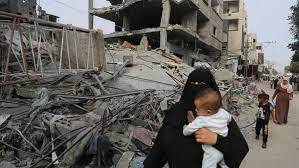
“Peace be upon the broken part in my heart, the one that does not make any noise” - Mahmoud Darwish.
Haunting images of limbless children covered in dust and blood, destroyed homes and sobbing mothers are flooding social media, depicting the horrors inflicted on the most vulnerable.
The war between Hamas and Israel has once again reminded us that armed conflicts have devastating impacts on women and children not only through direct violence but also indirectly through mental trauma, exposure to infectious diseases and malnutrition.
Nelson Mandela’s wife and the international advocate for women and children rights once said that “the impact of armed conflict on children is everyone’s responsibility. And it must be everyone’s concern.”
Unfortunately, there is a major lack of collective will to protect them from the brutalities of war. As a result non combatant civilians, especially women and children have been experiencing severe physical and mental trauma in this protracted conflict.
On October 7, Hamas rampaged through the border towns of Israel killing at least 1400 Israeli citizens along with taking some as hostages. Since then Israel has been pummeling Gaza with innumerable and indiscriminate air strikes resulting in the killing of approximately 7000 people. At the same time Israel has announced a complete siege of the territory, thus allowing only a limited access of food, fuel and water supply.
Prince Turki, a widely respected Saudi statesman has condemned both Hamas and Israel in the current scenario. He categorically criticised Hamas as they went against Islamic injunctions and harmed civilians.
Nevertheless, the Saudi prince accused Israel of “indiscriminate bombing of innocent Palestinian civilians in Gaza.” He also highlighted the fact that the Palestinian people had been provoked for approximately three quarters of a century. “There were no heroes,” he said, “only victims.”
According to one of the latest articles in The Guardian, “About half of Gaza’s 2.3 million population are children. Since October 7 , they have lived under constant bombardment with many packed into temporary shelters in UN run schools after fleeing their homes with little access to food or clean water.”
Children in Gaza constantly suffer from anxiety related issues and fear of death due to continuous violent occurrences. Expressing his deep concern on the suffering of children in Gaza, Antonio Guterres, Secretary General of United Nations said, “If there is hell on earth , it is the lives of children in Gaza.”
Densely populated areas in Gaza strip have come under attack, hence sharply increasing the possibility of severe harm to women and children.
According to UNICEF, “Over a week into the war, more than a thousand children have reportedly been killed and thousands more injured. Children and families in Gaza have practically run out of food, water, electricity, medicine and safe access to hospitals following hostilities and cuts to all supply routes.” As rightly said by Elie Wiesel, “When adults wage war, children perish.”
Since the very beginning of the military onslaught, women and children in Palestine have suffered immensely to unprecedented proportion. Hospitals and medical teams are not only overwhelmed but are relying on limited fuel in order to carry out the basic functions, thereby reducing access of women to reproductive and maternal health services.
A pregnant woman from Gaza told UNFPA that, “My baby was feeling every explosion.” At the moment approximately 50,000 women in Gaza are pregnant and reproductive insecurities can lead to a relatively higher mortality for women folk during the war.
Meanwhile the already hampered health infrastructure has severely compromised the overall well being of women and children alike. Currently large number of displaced people are living in overcrowded places where poor sanitation and lack of provision of clear source of water can promote spread of diseases.
At the same time disruption in food availability in Gaza is most likely to cause starvation and in extreme cases even mortality. The words of Mary Oliver unmistakably illustrate the situation for women and children in Gaza. She states, “It is a serious thing just to be alive on this fresh morning in this broken world.”
Women, who are the primary caregivers and are instrumental in providing sense of family are either being injured or killed during war and therefore resulting in a devastating situation for minors, who are losing support system and eventually exhibiting a broad range of distress reactions. During the recent crisis, children of Gaza strip have been experiencing high rates of psychosocial distress on daily basis.
Although Gazan children have always been on the brink of mental health crisis, but in the current scenario incalculable suffering is being inflicted on women and children thereby forcing them to live in a perpetual state of fear and grief. If children are to be protected, there must be women to sustain and rebuild homes after the war but the world has failed to address this crucial humanitarian issue and unfortunately the far reaching impacts on women and children have been unheard and over looked despite being extensively shared on the media.
No concerted efforts have been made so far to reduce the horrendous impact of the catastrophic event entailing grave consequences for the women and children. Consequently, setting a dreadful example of deteriorating standards of human rights.
As Ronald Reagan puts it, “Peace is more than just an absence of war. True peace is justice, True peace is freedom and True peace dictates the recognition of human rights.”

